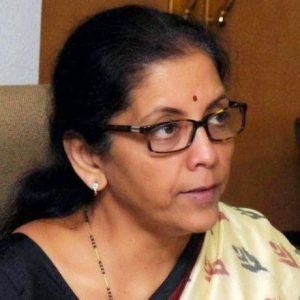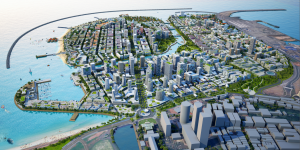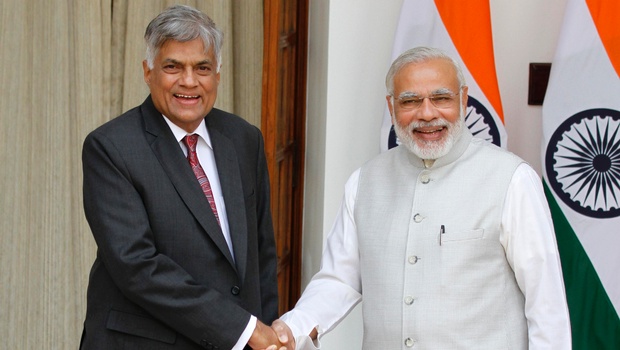New Delhi, October 6 (NIA): India has shed its reserve about quickly negotiating the Economic and Technological Agreement (ETCA) with Sri Lanka and has yielded to Sri Lankan pressure to conclude the deal by the end of 2016.
This is one of the important outcomes of the talks between Sri Lankan Prime Minister Ranil Wickremesinghe and his Indian counterpart, Narendra Modi, in New Delhi on Wednesday.
A day after he met Modi, Wickremesinghe told the Indian Economic Summit on Thursday: “Prime Minister Modi and I decided we must conclude the Economic and Technical Co-operation Agreement by the end of this year.”
Justifying it he said: “ETCA offers a strategic economic advantage to our country and the fastest-growing southern Indian States.”
Wickremesinghe said that closer economic ties can especially boost India’s five southern States. Pointing out that Sri Lanka and the five southern States, including Karnataka, Andhra Pradesh and Tamil Nadu, together have a population of 272 million people and a combined Gross Domestic Product of over US $500 billion, he said there is room to grow much faster if the two countries work together.
“These five States, with Sri Lanka, have an economy, whose GDP is equivalent to that of Sweden,” Wickremesinghe added.
Why Was India Wary?
Given the opposition to ETCA in Sri Lanka even before negotiations had started, India did not want to fast track the negotiations and sign it by year end as per the plan given by the Sri Lankan government.
In fact, India’s Commerce and Industry Minister Nirmala Sitharaman had told the media here recently that while India would like to enter into an ETCA with Sri Lanka, it would not set a time limit to conclude the negotiations.
India, she explained, wants to discuss all the issues in detail and consult all the stakeholders in both the countries before finalizing the pact. This is the only way to get a lasting agreement, she said.
But Wickremesinghe Persisted
However, Sri Lankan Prime Minister Ranil Wickremesinghe, the originator of the idea of ETCA, and the first one to formally propose it, has been keen on swinging the deal by 2016 end.
He finally got a chance to take it up with India at the highest level in New Delhi when he met Indian Prime Minister Narendra Modi on Wednesday. He succeeded in getting Modi to agree to his timetable.
“We are cognizant that the economic asymmetry between us and India is going to increase in the future, when the latter emerges as a global player in an increasingly multi-polar world,” he noted, reasoning out the need for a comprehensive agreement like ETCA.

Need For Cooperation Between Bay Of Bengal Littoral States
Wickremesinghe suggested to Modi, the creation of a larger Special Zone For Economic Cooperation around the Bay of Bengal, which takes on board Singapore, Indonesia and Malaysia in addition to BIMSTEC countries. BIMSTEC stands for Bay of Bengal Initiative for Multi-Sectoral Technical and Economic Cooperation and its members are Bangladesh, India, Myanmar, Sri Lanka, Thailand, Bhutan and Nepal.
“Let’s make the area around the Bay of Bengal vibrant with economic cooperation,” he exhorted.
Sri Lanka is negotiating a Free Trade Agreement (FTA) with Singapore, while India already has an Comprehensive Economic Partnership Pact (CEPA) with the latter. Therefore, there is scope for a trilateral arrangement to boost the three economies, Wickremesinghe pointed out.
China Agrees Not To Use Sri Lanka For Military Purposes
The Sri Lankan Prime Minister said Sri lanka is negotiating a Free Trade Agreement (FTA) a with China under its “One Belt, One road” initiative as this is necessary to make Chinese investments in Sri Lanka realize their full potential. But there is no military angle to it and China has agreed to Sri Lankan condition that the projects will not have a military dimension at all, he said.
“There’s been a lot of suspicion as to a military element in it. There is none and we have told that very clearly to the Chinese. The Chinese have agreed,” he asserted.

Asia Will Soon Bail Out Troubled Western Economies
Wickremesinghe took a jab at the developed world and said that Asia’s fast growing economies can bail out the world economy.
“The rules of globalization were written by the West and the Empire. We have only played by it. At the end of the day, it’s not neo-liberalism or free-market or anything else that worked,” he observed.
“Asia will bail the world out, if we are allowed to write the rules. Otherwise we create our own system and deliver (on making our people happy) by building our own markets,” Wickremesinghe said.




























































